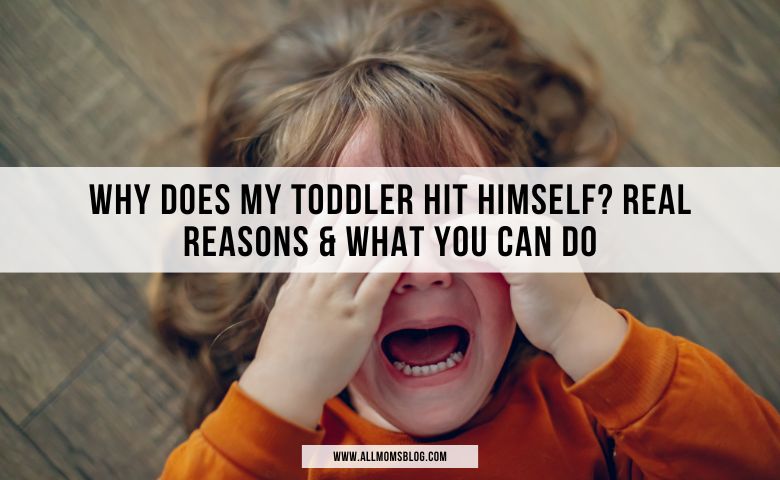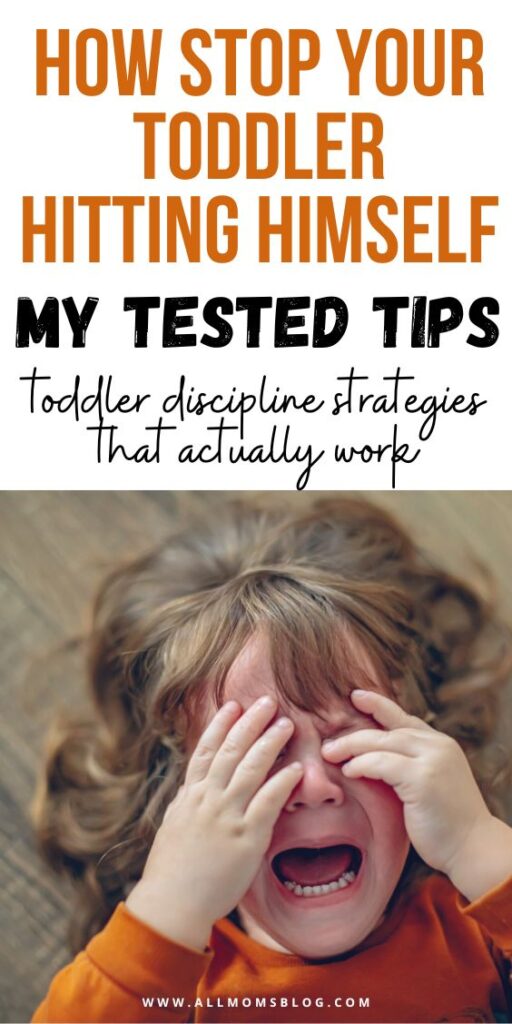Why does my toddler hit himself?
Toddlers often hit themselves because they feel overwhelmed by big emotions, want sensory input, copy what they see, or respond to pain. It’s a normal phase for many kids, but you can guide them with gentle tools and lots of patience.
Common reasons toddlers hit themselves:
- Big feelings like frustration or jealousy
- Sensory overload or wanting more stimulation
- Copying behaviors they’ve seen
- Trying to soothe pain (like teething)
Keep reading to learn what each of these means — and how to support your toddler through it.
Well, let’s agree to the fact that toddlers go through several growing stages of development. It’s just a matter of time before your little one turns from a sweet-tempered infant to a small monster. I’m a mother, and I totally understand this frustration.

My baby once started hitting himself just because I didn’t buy him his favorite chocolate. That scene still haunts me: when he grabbed his hair with tiny fingers and started slapping himself. I wasn’t sure what to do. Soaked in worry, I began learning about how toddlers shift their behavioral patterns during the developmental phase.
I mean, it’s pretty normal if they take their frustrations out on adults, but self-harm? That’s quite concerning, right? I talked to my healthcare provider, and let me tell you, unhealthy patterns are never something to overlook. So, in this article guide, we’ll take a closer look at why my toddler hits himself and what we can do to cope with the situation.
Keep reading this blog till the end if you, too, are a little too concerned for your toddler.
Real Reasons Behind the Behavior
As your toddler enters the growing stage, it’s pretty normal to expect unusual things from them. One minute, they are this sweet little munchkin, and the next minute, they’ll turn into a fight club. Smashing and banging everything that comes into their sight.
Here I’m going to tell you what I learned, and what experts say about the potential reasons why a toddler might be hitting himself.
Overwhelming Emotions
Overwhelming emotions are a top reason toddlers hit themselves. They can’t yet express big feelings like frustration or jealousy.
These mini creatures experience intense emotions, unsure of how to deal with them. An emotion too big for them to understand, and watch them tripping.
I remember once I took my little one to the grocery store, leaving my toddler behind, and when I came back, I witnessed something I was never ready for. He started smashing everything, broke my dinner plates (Yeah,) and ended up screaming and hitting himself.
So, what I am trying to say here is that it could be any emotion, overwhelming for them, from anger, jealousy, frustration, or anything else. Well, it’s safe to say that if a child is hitting himself, it’s their way to vent out their burdened emotions. And this is exactly what we want to help them with, right?
Bring alternate coping mechanisms. Moms, don’t let them use self-harm as an emotion regulation tool, or you will regret it in the long run.
Moreover, as per experts, an infant might start shaking their head from side to side, or simply, more language limitations = sudden outbursts in the form of self-harm.
What You Can Do?
As a parent, what can you do here? I get it, no one can watch their child go through something like this and stay silent.
I tried some tips that helped regulate my little ones’ emotions.
- Start by labeling their emotions (make them learn words so they can explain their frustration)
- Offer them a physical outlet, like a pillow, so they scream into it instead of hitting themselves.
- You can help them stay calm by offering simple coping mechanisms like communication.
- Try warm hugs, gentle touches (it makes them feel safe)
- Validate their emotions; it’s very important.
- Offer them familiar stuff they are attached to. It can be something like swaddling, which helps them sleep and soothes them.
If you’re also dealing with outright defiance alongside self-hitting here’s what you should do to turn their defiance into obedience.
Before I discuss another reason, let me tell you something: don’t let your little one fall into a trap of unhealthy coping mechanisms. They are just going to build a hard shell, and no good is going to come out of it.
Sensory Overload or Sensory Seeking
Sensory overload is another reason toddlers might hit themselves. When sounds, lights, or textures overwhelm their developing senses, self-hitting can be their way to cope or block out extra input.
Just like you, I had no idea what this term was until my toddler started hitting himself as a result of an outburst.
So, what happens is that toddlers might go through meltdowns if their senses become too overwhelming for them.
While their brains are still in the development phase, toddlers can become hypersensitive to everyday noises and other senses. It stimulates a negative reaction in their nervous system, causing them to become agitated.
Such behaviors act like an “emergency brake”, a way to shut out sensory input and regain equilibrium.
Studies in autism communities show a clear link between sensory-seeking behaviors and self-injury; self-hits are sometimes a way to satisfy a sensory need.
Still not sure why it leads to self-hitting?
Here’s why:
- Self-hits block external sensations
- Self-hits satisfy internal need
What You Can Do?
Try these tips and share any differences if felt.
- Offer them noise-cancellation headphones if your toddler is hypersensitive to sounds
- You can build a calm space around them by validating their emotions.
- Mommie, you can offer sensory tools to them, like fidget toys, to redirect their self-hitting behavioral pattern.
- The most useful thing you can do here is watch for triggers (believe me, this is the most helpful tip).
- Make use of deep pressure activities like rolling the whole body in a blanket, giving warm hugs.
If your toddler’s self-hitting seems tied to tantrums or the classic “terrible twos,” you’ll find more tips in my post on dealing with the terrible twos.
Learned Behavior or Copying Others
Learned behavior is another common reason toddlers hit themselves. They often copy what they see — from siblings, cartoons, or even adults.
I don’t think there’s anyone who doesn’t know that toddlers try to copy what others do. And sorry to break it to you, but it can be one of the most important reasons if you are wondering why toddlers hit themselves.
These harmful behaviors can be induced by copying others.
You’ll see them copying gestures, reactions, and no wonder, they start copying self-harming patterns too.
As per Michigan State University Extension experts, toddlers are little copycats. I remember my 2-year-old mimicking his favorite Mickey Mouse character. Children tend to imitate aggressive behavior they observe closely, leading to self-hitting as a way of showing their frustration.
In a nutshell, this can simply be their way to get a response.
What You Can Do?
Learned about the problem, okay! But what can we do to get rid of it, so your little one doesn’t engage in self-harm?
- Show them that you can handle frustration by calmly reacting to it.
- Try using gentle redirection. If your 2-year-old is hitting himself, tell them to hug their teddy bear instead.
- Appreciate their positive copying and defy if they are mimicking something negative.
- Try a role-play scenario; it helped me, and I believe you won’t regret it.
- Always ignore attention-seeking patterns; if they are doing something that is not causing self-harm, try staying neutral.
In short, if this behavior seems learned, not emotionally driven, it’s often a copycat phase. Your calm modeling and gentle guidance can turn the tables. Here’s how you can make your child listen without yelling.
Response to Pain or Discomfort
For this one, keep the rule simple: if you wonder, why do toddlers hit themselves, it can be their way of saying, “IT HURTS MOM.”
Well, I still cry when I get injured, babies are babies then, right?
Your little one might be trying to numb their internal ache by hitting themselves. Healthline confirms kids sometimes use self-hitting as self-soothing during pain episodes.
When my little one started slapping his cheek, I checked for fever, and I realized his molars were pushing through. Turns out, a teether and gentle cheek massage did wonders.
So, if you are going through something similar, help them with soothing teething. And hey, there’s no need to go through a rabbit hole to find the best teether. This blog guide covers it all, from affordable options to cute ones.
What You Can Do?
Here’s what you can do to help your 2-year-old who is hitting himself.
- Start by checking the physical causes first.
- Soothe their pain by gently massaging the area, which will help them if they are inclined towards self-harm.
- Track their time patterns of self-harm, it’s around meal time, meaning they are facing internal discomfort.
I think we have discussed everything needed to know about the question: why does my toddler hit himself? Spot your pain point and help your little ones in their growing journey.
Key Takeaways
- Toddlers hit themselves to cope with big feelings.
- It can be a response to frustration or stress.
- Sensory overload or seeking can trigger it.
- They may copy what they’ve seen others do.
- Pain or discomfort is a common cause.
How to stop a toddler from hitting himself:
- Label feelings clearly
- Offer hugs or safe objects to hit
- Watch for sensory overload triggers
- Provide teething toys
- Stay calm and model good behavior
Bottom Line
Coming to the end of this discussion, I think you can better understand the growing phase of your little one and act accordingly.
FAQs
Why do toddlers hit themselves when angry?
Toddlers often hit themselves when angry because they don’t have the words to express big feelings. It’s their way of releasing frustration. Gently help them label their emotions and show calmer ways to cope.
Is a toddler hitting themselves a sign of autism?
Not always. Many toddlers hit themselves as a normal stage of emotional development. However, if it’s frequent, intense, or combined with other signs (like delayed speech or avoiding eye contact), talk to your pediatrician.
Why does my toddler hit his head with his hand?
It might be a reaction to overwhelming emotions, sensory seeking, or even teething pain. Observe when it happens and offer comfort or sensory tools.
My 2-year-old hits himself in the head should I worry?
Most of the time, it’s a phase that passes as toddlers learn better ways to communicate. Still, keep an eye on it and guide them gently. If it’s severe or worsening, consult a doctor.
What should I do when my 4-year-old hits himself when upset?
Stay calm, validate their feelings, and give them safe alternatives like hugging a pillow. Show them healthier ways to express frustration, and reinforce positive behavior.

Disclaimer: This content is for informational purposes only and is not intended as a substitute for professional medical advice, diagnosis, or treatment. Always consult your healthcare provider with any questions you may have regarding a medical condition. Our blog posts contain affiliate links. These don’t cost you anything extra, but they allow us to continue running this site and providing free content for our readers. Please read my full disclosure here.

Aiman Malik
Hi, I’m Aiman; a mom first, writer second. I share stories from my own messy, beautiful journey through parenthood, along with tips backed by experts (and lots of trial and error). If you’ve ever felt overwhelmed by toddler behavior, trust me, you’re not alone. I’m right there with you, learning one meltdown at a time.
